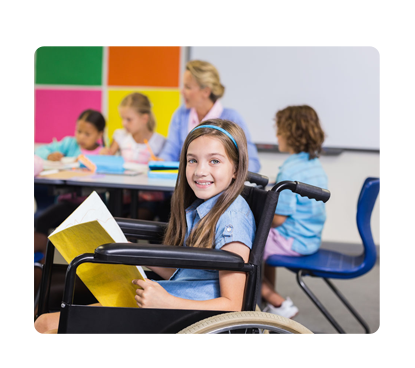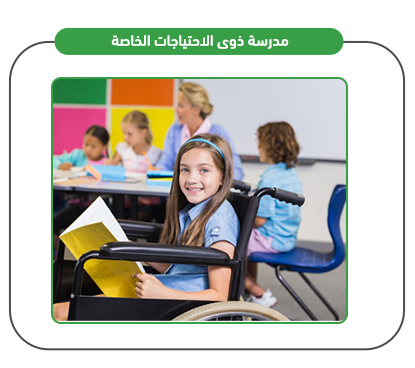The Special Needs School provides a distinguished educational environment focused on meeting each student’s individual needs through innovative educational programs and customized curriculum. The school adopts a comprehensive curriculum that integrates academic and rehabilitative aspects, enabling students to develop their intellectual and social abilities simultaneously. Additionally, the Special Needs School provides specialized support through an integrated team of teachers with experience in dealing with various disabilities. To achieve the best results, educational activities are designed based on modern educational techniques that take into account individual differences and enhance self-confidence and independence. The school also encourages students to participate in social and sports activities, which contributes to their positive integration into society. It is worth noting that through this integrated approach, the school seeks to achieve comprehensive educational goals that include developing life skills and enhancing personal competencies, ensuring every student has the opportunity for academic and social success and advancement.

The Special Needs School project aims to establish a school specializing in the care and rehabilitation of children with special needs. The school includes a group of departments that provide integrated services, with the goal of addressing educational and learning aspects, as well as rehabilitation services for children unable to lead normal lives. To achieve this goal, the project relies on the latest scientific and educational methods, utilizing modern technology to ensure competitive services that enable the school to meet the growing demand for this type of service. Given the importance of investing in the social and educational sectors, both in developed and developing countries, the Special Needs School project stands out as a unique opportunity to enhance communities’ capabilities to meet the special needs of children. Furthermore, the project seeks to develop children’s talents and prepare them for effective integration into society. The school project not only provides basic services but also aims to achieve rewarding investment returns, making it a sustainable model that combines social impact and economic feasibility.<br><br><br>

Rehabilitation services to improve physical and mental abilities.<br>Psychological and social support to enhance adaptation and self-confidence.<br>Training programs to develop life and work skills.<br>Innovative educational techniques and tools to enhance learning.<br>Recreational and sports activities to enhance social interaction.<br>Social integration programs to prepare students for community engagement.


A learning environment tailored to meet the needs of each student.
Flexible curricula focused on interactive learning.
A dedicated team of teachers and specialists.
Innovative teaching techniques to enhance the learning process.
Individualized care for each student to ensure significant progress.
Providing diverse learning strategies tailored to the diverse needs of students.
Physical and occupational therapy programs to improve motor skills.
A safe and supportive environment to encourage learning and interaction.
Continuous support for families through counseling and guidance.
Focusing on promoting independence and achieving self-reliance.
Organizing training workshops for teachers to develop their skills.
Executive summary
Study project services/products
Market Size Analysis
Risk Assessment
Technical study
Financial study
Organizational and administrative study

The Kingdom of Saudi Arabia is the largest Gulf country in terms of spending on education, spending approximately 25% of its general budget on the education sector.
Total education allocations in the Kingdom of Saudi Arabia for the academic year 1437/1438 AH (1997-1998) amounted to 211,836 million riyals.
The total number of students in the Kingdom at the primary, intermediate, and secondary levels reached 7,277,317, representing 22% of the Kingdom’s population.
The total number of students in the primary level reached 3,734,692 in 2016, with males accounting for 51%.
The total number of students in the intermediate level reached 1,682,509, with males accounting for 51.8%.
The total number of students in the secondary level reached 1,860,116, with males accounting for 51.7%. The Makkah and Riyadh regions accounted for 48% of the total number of students in the Kingdom of Saudi Arabia in 2016, with Makkah accounting for 27.9% and Riyadh for 20.1%.

Investment in the Saudi private education sector grew by 3% in 2016, rising to 15.5% compared to 12.5% in 2015. Investment in the private education sector has increased over the past five years, reaching approximately 10 billion riyals.